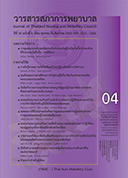Benefits of a Self-Care-Promoting Programme for Cataract Surgery Patients’ Knowledge and Self-Care Behaviour
Keywords:
self-care-promoting programme, cataract, self-care behaviourAbstract
Objective: To examine cataract surgery patients’ improvement in their knowledge and self-care behaviour after receiving a self-care-promoting programme.
Design: Two-group quasi-experimental research, with a pretest and a posttest
Methodology: The subjects, recruited by means of purposive sampling, were 50 cataract surgery patients treated at a tertiary hospital between April and July 2018. They were divided into a control group (n = 25) and an experimental group (n = 25). The control group received standard nursing care, whilst the experimental group received a self-care-promoting programme. The self-care programme comprised: 1) a video on cataract; 2) a lesson on pre- and post-cataract-surgery self-care; 3) a lesson on using sterilised eye wipes, eyedrops, eye swabs, and eyeshields; 4) a post-cataract surgery self-care manual; and 5) a plan for pre- and post-surgery phone-mediated monitoring. Data were collected between April and August 2018, through 1) a test of knowledge of cataract and post-surgery self-care and 2) a form designed to assess cataract patients’ post-surgery self-care behaviour. The data were analysed using descriptive statistics and independent and dependent t-test.
Results: The experimental group’s post-intervention mean scores on cataract knowledge and on self-care behaviour were significantly higher than their pre-intervention scores, and also significantly higher than the control group’s scores (p < .05).
Recommendations: The results indicated that the self-care-promoting programme increased the patients’ knowledge and improved their self-care behaviour. Hence, it is recommended that this programme be applied to patients having undergone cataract surgery to enhance their self-care ability.
Downloads
References
Khairallah M, Kahloun R, Bourne R, Limburg H, Flaxman SR, Jonas JB, et al. Number of people blind or visually impaired by cataract world and in world regions 1990 to 2010. Inv Oph & Vis Sc 2015;56(11): 6762-6769.
Pangputupong P, Isripradit S, Tonginnate A, Yingyong P, Chaisrisawatsuk N, Wongsawat W, et al. In: Makornsarn C editor. Thailand medical service profile 2015-2018. Ministry of Public Health; 2019. (in Thai).
Lapchurat A. Effect of health promoting program and prevent postoperative complication toward knowledge and practice for cataract surgery elderly patients suratthani hospital. Region 11 Medical Journal 2018;32:1099-1112. (in Thai).
Thammasat University Hospital. Patient service statistics. Pathumthani: Thammasat University Hospital; 2018. (in Thai).
Jimasa L, Changjeraja W. The effect of perioperative preparatory program on anxiety and complications in patients underwent cataract surgery in ophthalmology clinic at bueng kan hospital. Academic Journal of Mahasarakarm Provincial Public Health Offce 2020;4(7):75-87. (in Thai).
Orem D. Nursing Theories and their function as conceptual models for nursing practice and curriculum development. In: Renpenning MK., Taylor SG editors. Self-care Theory in Nursing: Selected Papers of Dorothea Orem. NewYork: Springer; 2003. P.108-16.
Bandura A. Social learning theory. New Jersey: Prentice Hall; 1977.
Petsiri P. Effects of health teaching using live model on anxiety and self-care ability of cataract surgery in elderly patients [dissertation]. Bangkok: Chulalongkorn Univ.; 2007. (in Thai).
Rodchua A. Effects of self-care promoting program toward knowledge and practice for cataract surgery patients rajavithi hospital. Journal of Health and Nursing Research Boromarajonani College of Nursing Bangkok 2012;35(2):1-12. (in Thai).
Srikulwong T, Sasat S. The effect of concreateobjective information and giving information through social media on anxiety in preoperative cataract adult patients. Journal of The Police Nurses 2015;7(1): 117-127. (in Thai).
Pankasikorn P, Kitsripisarn S. Knowledge attitude and self-care behaviors of cataract out-patients at thammasat university hospital. Eye Sou Eas Asi 2018;13(1):23-32.98
Sanitlue N, Satpetch W, Napaarak Y. G*power sample size calculation using g*power program. Journal of Suvarnabhumi Institute of Technology Humanities and Social Sciences 2016;2(2):496-507. (in Thai).
Kitsripisarn S. Perceptions and needs for necessary knowledge about self care among patients with one day cataract surgery and caregivers. Thai Science and Technology Journal 2012;20(5):437-48. (in Thai).
Yairungsri D, kwanyun R, kuasukon C. Knowledge, attitude and self-care of the top 5 Buddhist monks (cataract, chronic obstructive pulmonary disease hypertension, diabetes mellitus and ischemic heart disease). Bangkok: Academic Service Priest Hospital 2007:1-12. (in Thai).
Chadthai Y, Wanitchakul N, Pattaramongkol S. Effects of education via video and model on knowledge and post operative self care behavior among patients undergoing cataract surgery at a mobile medical unit. Sonklanagarind Journal of Nursing 2016;36(2):159-70. (in Thai).
Sunancho P. Effectiveness of self breast examination promotion program among 35-60 years old female in Talat Khae municipality Nonsung district Nakornratchasima province. North Eastern Primary Health Care Journal 2009;23(6):31-42. (in Thai).
Pholuthai T, Banchonhutthakit P. Effects of self care behavioral modifcation program for blood sugar control among elderly patients with type 2 diabetes mellitus: Case study in Huaikeng subdistrict Kumpawapi district Udonthani province. Srinagarind Medical Journal 2013;28(4):421-30. (in Thai).








